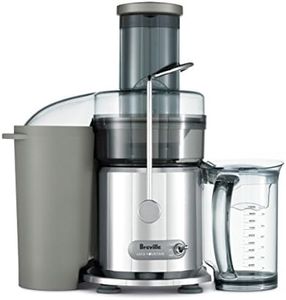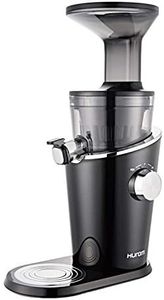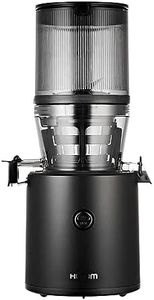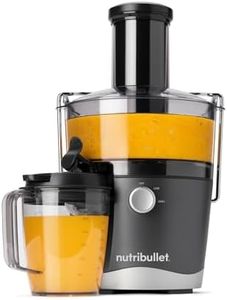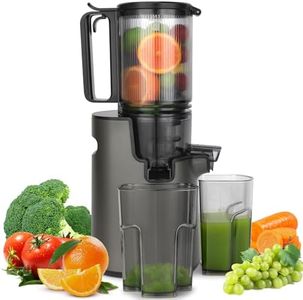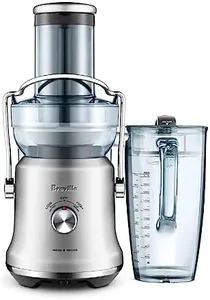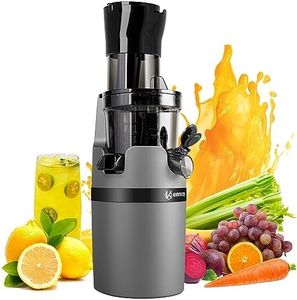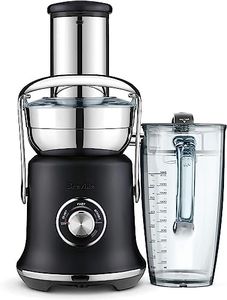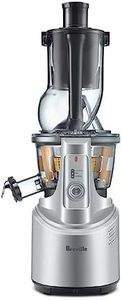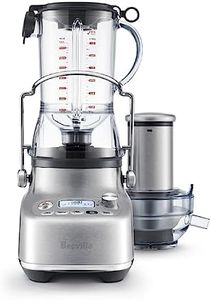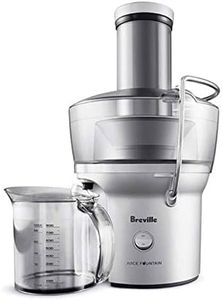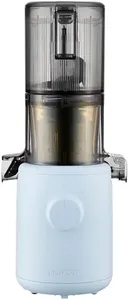We Use CookiesWe use cookies to enhance the security, performance,
functionality and for analytical and promotional activities. By continuing to browse this site you
are agreeing to our privacy policy
10 Best Compact Juicers
From leading brands and best sellers available on the web.By clicking on a link to a third party's website, log data is shared with that third party.
Buying Guide for the Best Compact Juicers
Choosing a compact juicer is all about finding a balance between size, efficiency, juice quality, and ease of use. Compact juicers are perfect for those with limited kitchen space or who want a device that’s easy to store and move around. When shopping for one, it’s important to consider your typical fruits and vegetables, how often you plan to juice, and your cleaning preferences. Understanding the main features and what they mean can help you make a choice that fits your needs and lifestyle.Size and FootprintThis spec tells you how much space the juicer will take up on your counter or in storage. A smaller footprint is easier to fit in tight kitchen spaces and to put away when not in use. Compact juicers typically range from very small models that can fit in a drawer to slightly larger versions that still use less space than traditional juicers. Think about where you’ll keep your juicer and how much room you have to spare. If counter space is extremely limited, look for the smallest possible design.
Juicing Mechanism (Centrifugal vs. Masticating)This refers to how the juicer processes fruits and vegetables. Centrifugal juicers use fast spinning blades, which are generally quicker but a bit noisier and may not extract as much juice from leafy greens. Masticating juicers, also called slow or cold-press juicers, use a slower pressing motion that can give you more juice, especially from tough or leafy produce, and often results in less foam and separation. For mainly hard fruits like apples or carrots, either type works, but if you want to juice leafy greens or wheatgrass, masticating is often preferable. Think about the types of produce you want to juice most often as your guide.
Feed Chute SizeThe feed chute is the part where you insert fruits and vegetables. A larger chute means you can fit bigger pieces, saving you prep time because you don’t have to chop as much. Compact models typically have smaller chutes, so you may need to cut produce into smaller pieces. If prep time is a big concern for you, look for the widest feed chute you can find in compact ranges. If you don’t mind a little chopping, a smaller feed chute can be just fine.
Ease of CleaningCleaning is a big consideration because a juicer that’s hard to clean can quickly become a hassle. This spec considers how many parts need cleaning and whether they’re dishwasher-safe. Some compact juicers have fewer parts and can be rinsed or wiped clean quickly, while others have small crevices or filters that need more effort. If you want to juice daily, opt for a model with the simplest cleaning process, especially if you dislike washing by hand.
Juice YieldJuice yield refers to how much juice the machine is able to extract from your fruits and vegetables. A higher yield means less wasted produce and more drink for your effort. Some compact juicers are better at maximizing yield, especially with leafy greens or soft fruits, while others might leave wetter pulp behind, indicating less juice extraction. If you want to get the most out of your produce, look for reviews or descriptions that highlight higher juice yield.
Noise LevelSome juicers can be quite noisy, especially centrifugal models, which may be an issue in shared living spaces or for early morning juicing. Masticating juicers tend to be quieter, but this can vary by design. If you are concerned about noise, check comparison information or look for user comments about how loud a given model is and consider where and when you’ll typically use your juicer.



